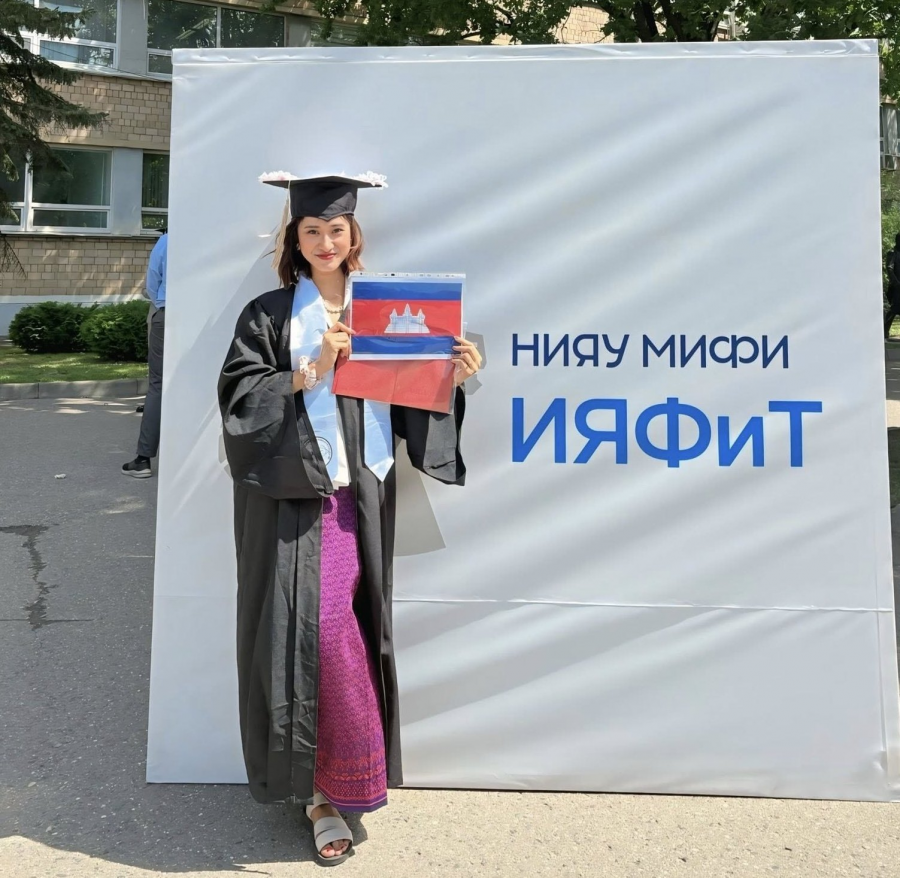Serey Rothana, a nuclear engineering graduate of a Russian university, plans to promote the study of nuclear energy. She said nuclear energy is not solely to build weapons. It also offers positive benefits that can aid in the development of Cambodia’s nuclear capabilities and the advancement of STEM fields.

Rothana was born in Krakor district, Pursat province. She pursued two bachelor's degrees simultaneously. One of them was electrical engineering at the Institute of Electrical Science, and the other was eco-business at the National University of Management (NUM).
She completed a two-year master’s degree in economics at NUM. Later, she had the opportunity to defend her thesis in Spain through the ERASMUS+ joint program and earned an A grade.
Through the Russian government scholarship, she recently completed another two-year master’s degree in nuclear power engineering and thermal physics from the National Research Nuclear University in Russia.
She said she spent a total of three years: one year studying the Russian language from 2022 to 2023, followed by two years of her degree from 2023 to 2025. The studies covered nuclear engineering and reactor physics, thermal systems, materials science, international nuclear law, and even 3D design using computer-aided design (CAD) software.
"National Research Nuclear University in Russia is one of the top universities in the world for nuclear science and the number one in Russia for this field", said Rothana.
She chose to study this field because she recognizes the benefits of atomic energy. Nuclear energy can contribute to a country's development through various sectors, including cancer treatment, medicine, agriculture, space exploration, clean water, food and cosmetics.
In Cambodia, Rothana learned about various energy sources, but there is limited information and resources when it comes to nuclear education. She has read and explored atomic power, discovering the power and diversity of nuclear technology.
“My love for physics started way back in secondary school, and the dream of becoming a researcher and scientist has stuck with me ever since. That dream, along with my curiosity and drive to contribute to my country’s development, is what led me to choose this field,” said Rothana.
Overcome the limited knowledge in nuclear study
Rothana began studying nuclear science during her master’s degree, facing challenges as she adapted to a new subject and the Russian education system, including oral exams.
She had to endure the extreme cold, feelings of homesickness, and the need to adapt to Russian culture and food. But her foreign friends helped make Russia feel like a second home. She also mentioned Rolando Menor Jr., who is a senior and her fiancé, encouraged her through every step.
“The courses were very tough, especially because I didn’t have a background in nuclear science. But I had amazing professors, supportive seniors, and friends who helped me through it all. I’m also deeply inspired by scientists like Marie Curie, Einstein, Kurchatov, and others,” she said.
How to obtain the scholarship
Rothana received her scholarship through the Russian Government Scholarship program, which opens around October and runs until January each year. The scholarship is usually posted by the Ministry of Education, Youth, and Sport, the Association of Cambodian Students in the Russian Federation, the Russian House of Science and Culture in Phnom Penh, and the Federation of Cambodian Students Abroad.
“To apply, you’ll need to create an account on the official scholarship website, fill out the application form completely, and submit all the required documents. After that, you’ll move on to the interview stage, where the selection committee will interview you,” she said.
A shortlist of candidates is sent to the Ministry of Education in Russia. They’ll review and evaluate the student’s profile and qualifications.
The final candidate names are usually announced around March or April. If a student is selected, the last step is to prepare the visa and flight arrangements to start their academic journey in Russia.
Pursuing a PhD to advance nuclear science
Rothana said her knowledge about nuclear energy is only scratching the surface. So, she applied for a Doctor of Philosophy (PhD) and has been accepted at another top university in Russia.
Her PhD is in the Physics of High Energy Atomic Nuclei at Tomsk Polytechnic University in Tomsk, the Russian Federation. She will start her academic year in October with a 4- to 5-year scholarship awarded by the government of Russia.
She is an awardee of the Marie Skłodowska-Curie Fellowship Programme from the International Atomic Energy Agency in Russia. The program provides scholarships and internship opportunities to young women pursuing master's degrees in nuclear-related fields.
Now, Rothana has obtained a license in civil nuclear engineering from Russia. She is committed to continuing to learn how she can use her knowledge and share it with others, especially the younger generation in Cambodia.
“I hope to one day contribute to building a strong STEM and nuclear research community back home. I especially want to see more Cambodian women in science and engineering,” she said.
Rothana’s main plans are to complete her PhD studies and gain hands-on experience through internships or collaborations with ministries or organizations in Cambodia or abroad.
She also plans to help build Cambodia’s nuclear capabilities, promote science, and inspire more young people, especially girls, to see themselves in STEM. STEM, which stands for science, technology, engineering, and mathematics, is an interdisciplinary field of study that plays a pivotal role in Cambodia’s development.





